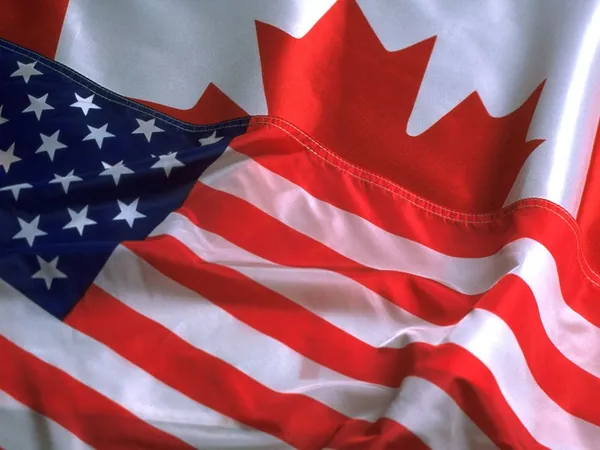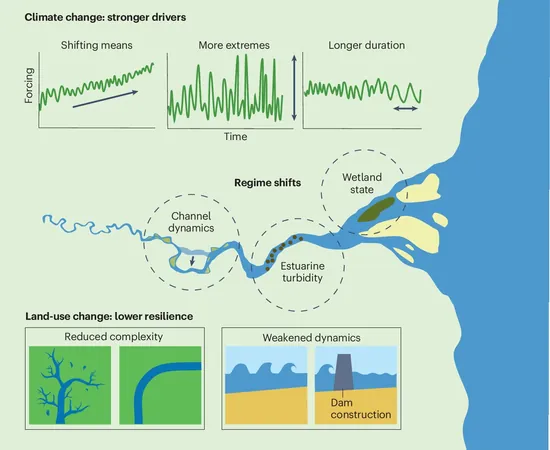
Looming Economic Crisis: Canada's Struggling Economy Faces Unprecedented Gap with the U.S.
2024-11-14
Author: Emma
Introduction
Canada's economy has experienced a troubling decline relative to the United States, and recent political developments threaten to exacerbate this trend. Economists are increasingly voicing concerns that the economic divide is set to widen dramatically under the current U.S. administration.
Current Economic Statistics
As of 2023, the per capita real gross domestic product (GDP) in the U.S. was a staggering 43% higher than in Canada. According to Trevor Tombe, an economics professor at the University of Calgary, this gap is projected to balloon to nearly 50% this year, marking an alarming divergence that is "unprecedented in modern history."
Impact of U.S. Policies
The advent of new economic policies following the election of Donald Trump has triggered a reassessment of forecasts for both countries. While the specifics of the economic impact are still unclear, many analysts predict that Trump's policy changes will lead to a short-term boost in U.S. GDP alongside increased inflation.
Conversely, Canada stands to suffer collateral damage from these developments. Although U.S. tariffs on imports from countries like China and Mexico might not directly target Canada, the repercussions could trickle down, resulting in negative spillover effects for Canadian industries.
Moreover, U.S. corporate tax cuts could further undermine Canada’s competitiveness on the global stage, as pointed out by RBC economists Nathan Janzen and Claire Fan.
Domestic Challenges
Domestic challenges compound these external pressures. The Canadian government's intentions to reduce immigration targets could alleviate housing shortages in the short term; however, this policy is expected to slow GDP growth significantly.
Economists warn that it will accelerate the aging of Canada's population and amplify funding issues for essential public services such as healthcare.
Mortgage Renewals and Economic Outlook
Additionally, Canadians are bracing for a wave of mortgage renewals at much higher interest rates over the next two years. This scenario has prompted Desjardins Group to lower their economic outlook for Canada, predicting that by the end of 2028, real GDP could fall by as much as 1.7%. While a recession may be narrowly avoided, it remains a real possibility.
Monetary Policy Divergence
The diverging economic trajectories of Canada and the U.S. also imply widening gaps in monetary policy. As inflation hotly drives the U.S. economy, the Federal Reserve will likely maintain higher interest rates, while the Bank of Canada could be forced to lower its rates to accommodate a softer economic landscape.
RBC anticipates that the Bank of Canada will reduce its rate to about 2% by the end of 2025, while the Federal Reserve is expected to stabilize rates between 4% and 4.25%.
Housing Affordability Improvement
Interestingly, amidst these challenges, Canada has seen a slight improvement in housing affordability due to decreasing mortgage rates and rising incomes in recent quarters. Nevertheless, mortgage payments as a percentage of income remain significantly higher than historical norms, causing many households to feel the financial squeeze.
Conclusion
In summary, the widening economic gap between Canada and the United States signals a potential crisis for Canada, with far-reaching implications for its workforce, infrastructure, and financial stability. As the situation evolves, Canadians are left to question how these looming developments will affect their economic future, and whether proactive measures will be taken to bridge this growing divide.









 Brasil (PT)
Brasil (PT)
 Canada (EN)
Canada (EN)
 Chile (ES)
Chile (ES)
 España (ES)
España (ES)
 France (FR)
France (FR)
 Hong Kong (EN)
Hong Kong (EN)
 Italia (IT)
Italia (IT)
 日本 (JA)
日本 (JA)
 Magyarország (HU)
Magyarország (HU)
 Norge (NO)
Norge (NO)
 Polska (PL)
Polska (PL)
 Schweiz (DE)
Schweiz (DE)
 Singapore (EN)
Singapore (EN)
 Sverige (SV)
Sverige (SV)
 Suomi (FI)
Suomi (FI)
 Türkiye (TR)
Türkiye (TR)